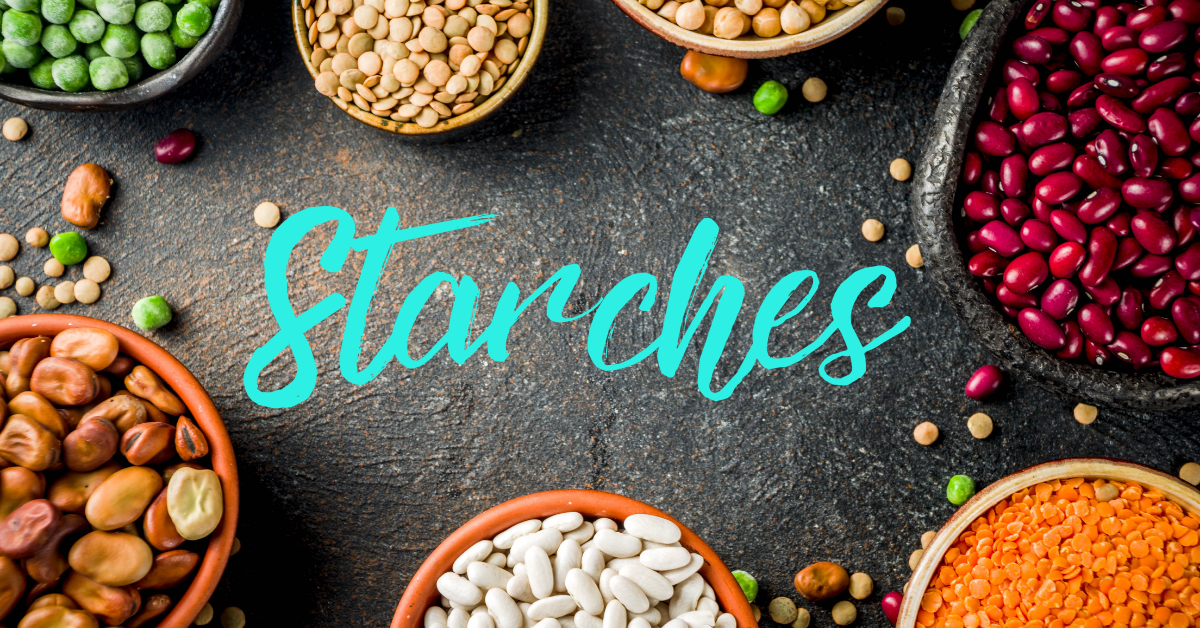Veronica Brady, CDCES explains starches and what to think about if you're managing diabetes.
Focus on Food, pt. 3
Here is the down low, the 411, the dirt on starches.
For most of us, it is the bane of our existence. Starches are a large part of the dietary intake of most Americans. When we think about starches the one that immediately comes to mind for most of us is bread, followed by rice and potatoes. For most people with diabetes, starches are considered the forbidden food.
What are starches?
Starches fall under the broad category of carbohydrates, along with fruits, milk, non-starchy vegetables and sweets. There are 3 main types of carbohydrates: fiber, sugar and starch. Some examples of starchy foods include grains and pasta (including whole grains and whole wheat pasta), white rice and brown rice, breads and crackers, starchy vegetables like white potatoes, sweet potatoes, and other root vegetables, beans (such as kidney beans and black beans), lentils and green peas.
Generally, starches (complex carbohydrates) will cause blood sugar levels to rise if you have diabetes. But, starches should not be seen as the enemy. They have health benefits and are necessary for our bodies to function properly on a balanced diet [1].
How much should I eat?
According to dietary recommendations the total daily carbohydrate intake for most of us should be between 45-65% of our calories. If you are eating 2000 calories a day, then 900-1300 of these calories can come from healthy carbohydrates. This means you would be allowed to consume 225-325 grams of carbs/day. However, keep in mind that for most of us, all of our carbs do not usually come from one source. So, you need to be careful to calculate the carbs from all sources (fruit and fructose, milk, non-starchy vegetables and sweets).
Which starches should I choose?
Some excellent sources of healthy starch include: vegetables, legumes, beans and whole grains. Healthy starches contain minerals and vitamins, natural sugar, and dietary fiber [2]. These nutrients are instrumental in maintaining a healthy diet as they can help protect from certain diseases like heart disease, help to control weight (and can even help with weight loss), and provide you with a source of long-lasting energy. That being said, we also have to keep in mind that a number of starch choices contain not only carbs, but protein and fat as well—making them one of the most complex components of our dietary intake.
In the booklet, Food Lists for Diabetes, the authors list a considerable number of breads, cereals, grains, starchy vegetables, crackers and snacks that are considered to be one starch choice. All of the foods listed contain- 15 grams of carb, 1 gram of fat, 3 grams of protein and are 80 calories[3]. This list can serve as a guide when evaluating the amount of starch (carbohydrates from starch) that you ingest daily.
Some things to consider when making starch choices:
-
Eat more legumes. Peas, beans and lentils. They are usually low in fat and contain some necessary vitamins and minerals. They contain fiber—which is beneficial for GI health–as well as provide a good source of protein. These foods also serve as 1 starch choice and 1 lean protein choice.
-
Choose whole grains. “Whole” wheat pasta, “whole” grain pita bread and crackers are a couple of choices. These foods also contain vitamins, minerals and fiber, and tend to have a lower glycemic index than their refined starch counterparts.
So go forth without fear and consume starches wisely.
Healthy eating and be well!
References:
1. Mayo Clinic. (2017, February 7). Carbohydrates: How Carbs Fit into a Healthy Diet. Retrieved from https://www.mayoclinic.org/healthy-lifestyle/nutrition-and-healthy-eating/in-depth/carbohydrates/art-20045705
2. Yacoub, J. (2018, December 14). How Much Starch Is Too Much in the Average Diet? Retrieved from https://healthyeating.sfgate.com/much-starch-much-average-diet-12125.html
3. Choose Your Foods: Food Lists for Diabetes (2019) Evert, A., Chomko, M., Cox, C., Harrington, C., Korsberg, J., Quintana, L., Sauter, C., Urbanski, P. & Wheeler, M. Academy of Nutrition & American Diabetes Association. Buy on Amazon


